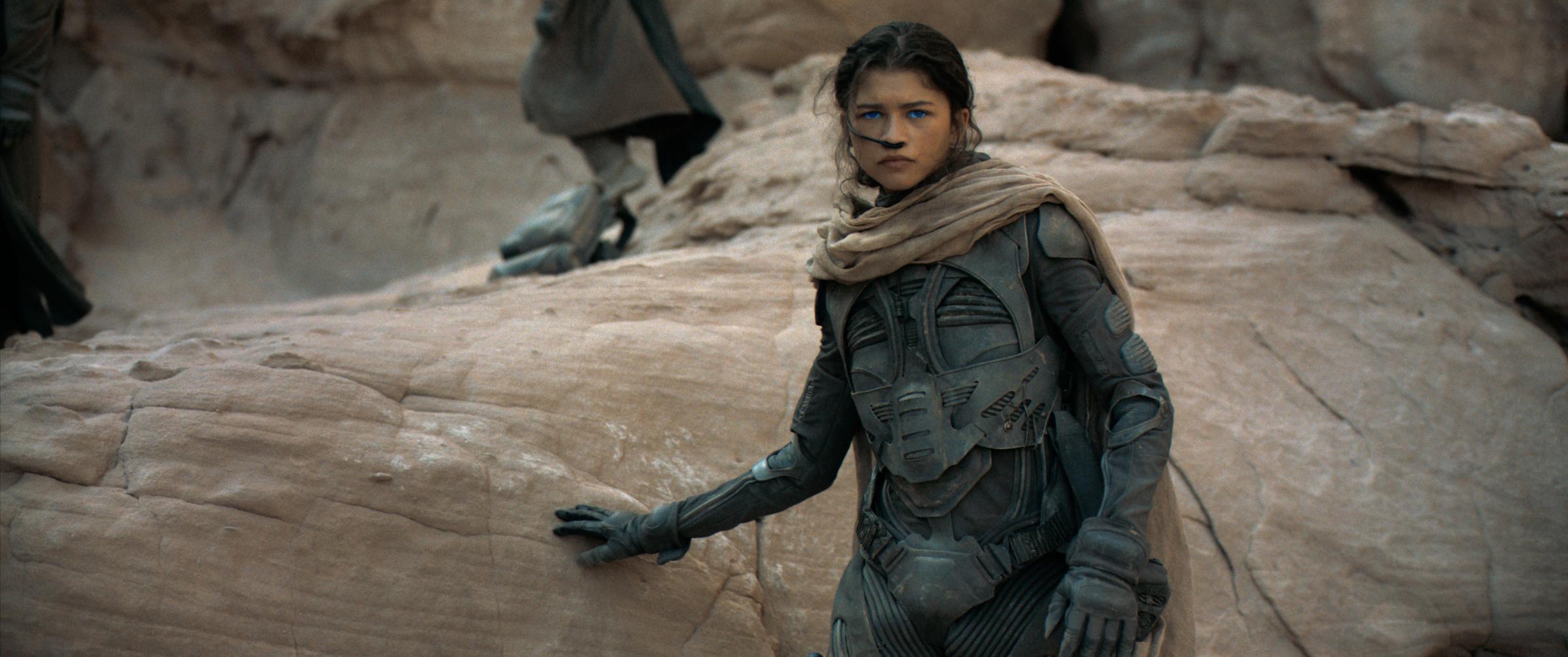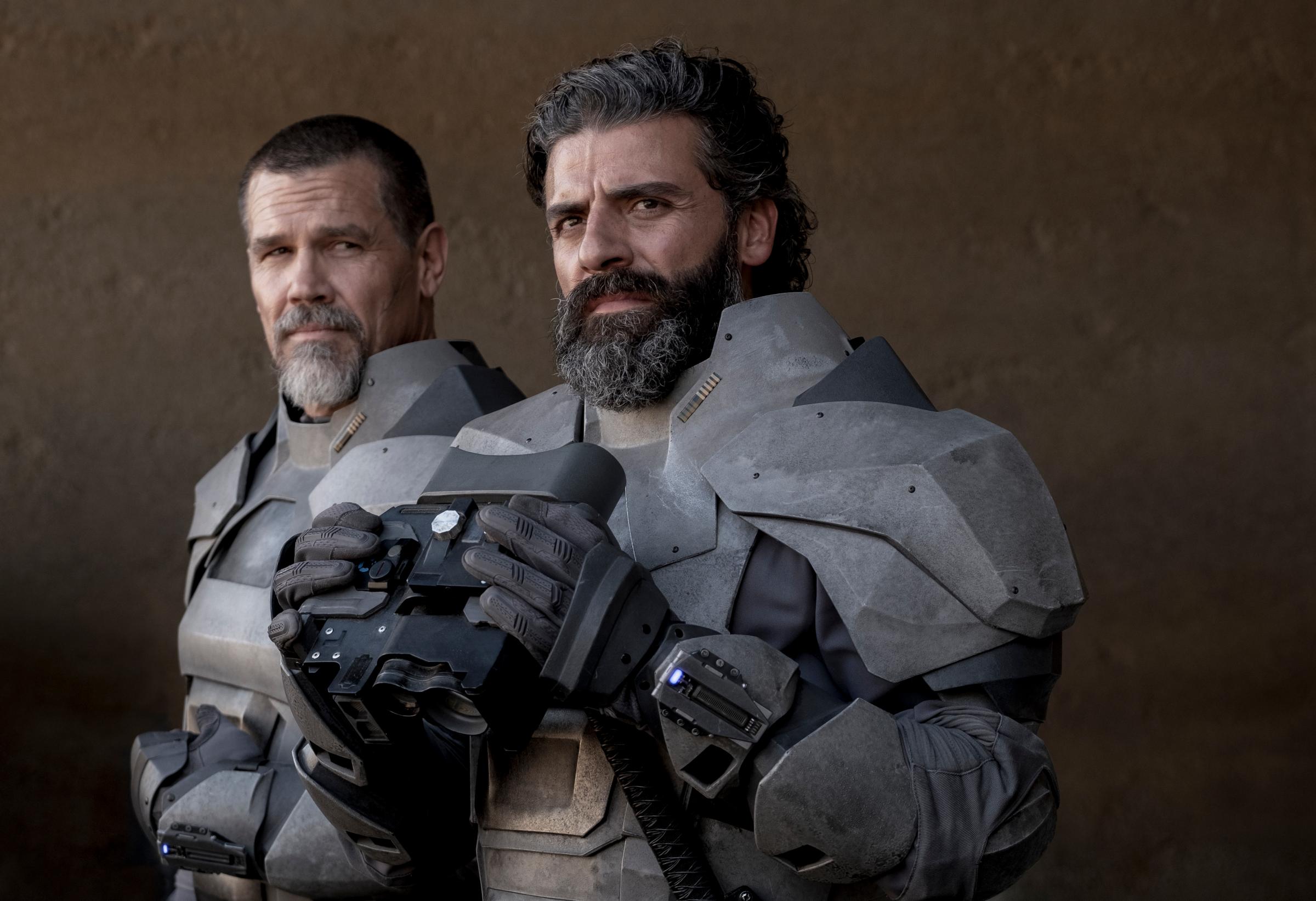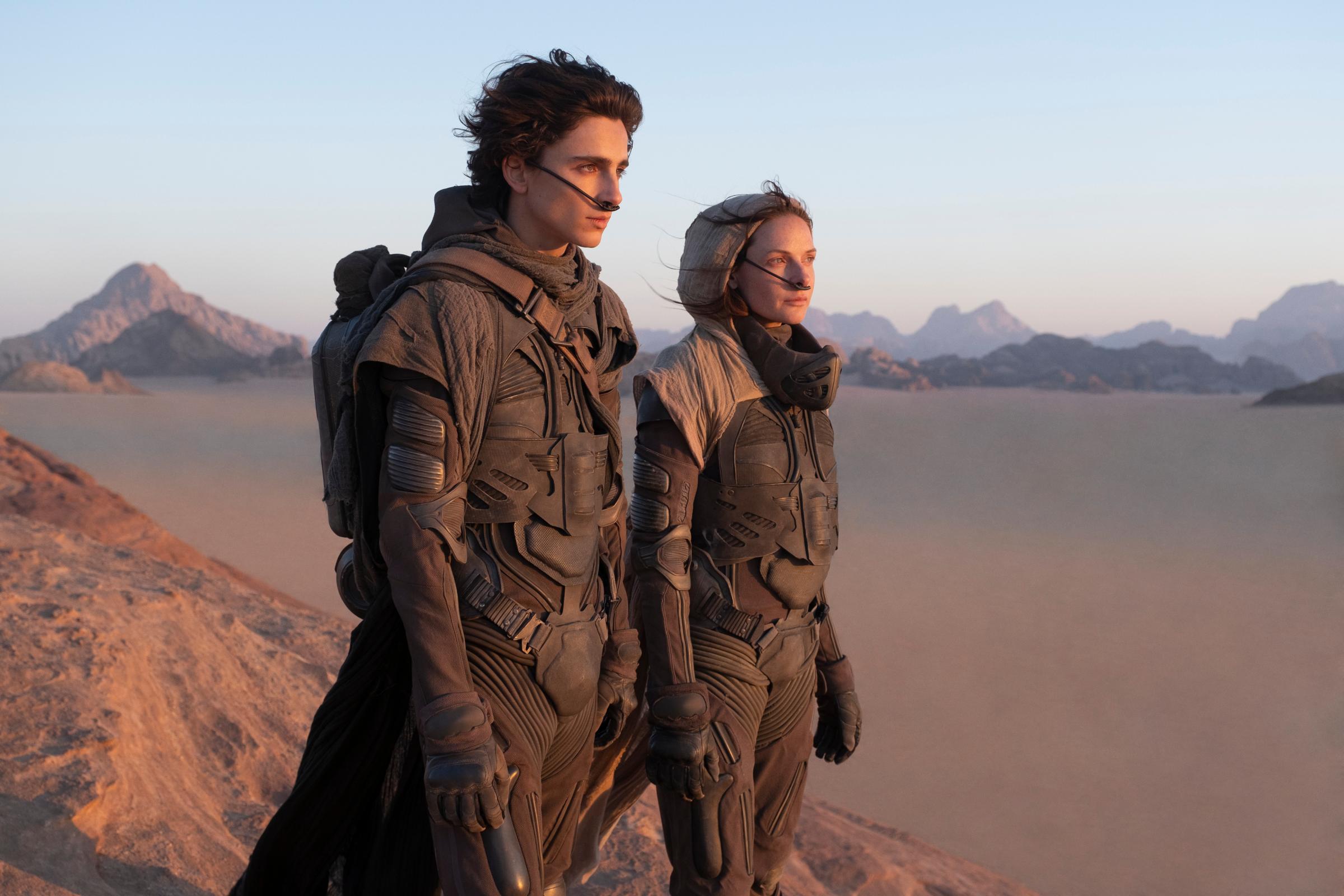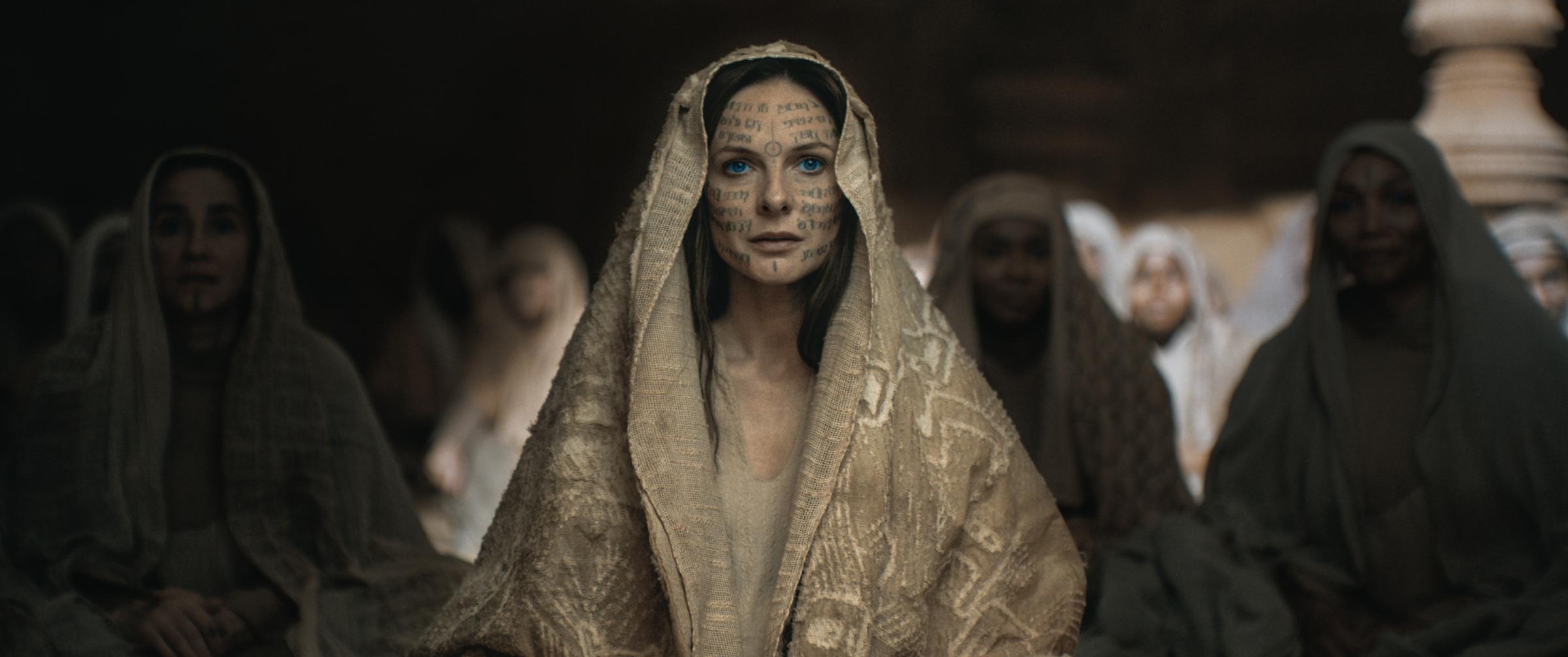Following a two-year hiatus—and an additional four-month delay brought on by the WGA and SAG-AFTRA strikes—Dune: Part Two is set to arrive in theaters on March 1.
The long-awaited sequel to the first film in Denis Villeneuve's Dune saga will conclude the story told in Frank Herbert's classic 1965 sci-fi novel, which follows Paul Atreides (played in the movies by Timothée Chalamet) as he's thrust into a galactic war for the valuable but deadly desert planet of Arrakis.
In 2021, Dune: Part One adapted the first half of Herbert's novel, centering on Duke Leto Atreides (Oscar Isaac), Paul's father and the leader of House Atreides, accepting stewardship of Arrakis only to be betrayed by the leader of rival House Harkonnen, Baron Vladimir Harkonnen (Stellan Skarsgård), with the covert support of Padishah Emperor Shaddam Corrino IV (played in Part Two by Christopher Walken), ruler of the galactic empire known as the Imperium. Dune: Part Two picks up right where the first movie left off, with Paul and his mother, Lady Jessica (Rebecca Ferguson), navigating an alliance with the Fremen, the native people of Arrakis, while seeking revenge against those who destroyed their family.
"For me, this film is much better than Part One. There’s something more alive in it. There’s a relationship to the characters,” Villeneuve said at a December press conference. "I was trying to reach for an intensity and a quality of emotions that I didn’t reach with Part One and that I did reach with Part Two."
Here's everything you need to know before seeing Dune: Part Two.
Read More: Denis Villeneuve Refuses to Let Hollywood Shrink Him Down to Size
What to remember from Dune: Part One
Set tens of thousands of years in the future in a feudal interstellar society in which various noble houses control planetary fiefs, the Dune universe is not for the faint of sci-fi heart. The story is complex, complicated, and grows increasingly bizarre as Herbert's series of novels progresses.
Dune: Part One opens with a voiceover from a young Fremen woman named Chani (Zendaya) explaining what's been going down on Arrakis since House Harkonnen took control of the planet 80 years earlier.
"My planet Arrakis is so beautiful when the sun is low. Rolling over the sands, you can see spice in the air," she says. "At nightfall, the spice harvesters land. The outsiders race against time to avoid the heat of the day. They ravage our lands in front of our eyes. Their cruelty to my people is all I've known. These outsiders, the Harkonnens, came long before I was born. By controlling spice production they became obscenely rich. Richer than the Emperor himself. Our warriors couldn't free Arrakis from the Harkonnens, but one day, by Imperial decree, they were gone. Why did the Emperor choose this path? And who will our next oppressors be?"

The so-called "spice" that Chani speaks of is a a byproduct of the lifecycle of the giant sandworms that inhabit Arrakis and therefore can only be found on the desert planet. It's a mysterious, psychedelic substance that expands consciousness, increases life expectancy, and allows for interstellar space travel, making it the most valuable commodity in the universe. Basically, whoever controls the spice has the power to rule.
Meanwhile, on the oceanic planet of Caladan, the ancestral home of House Atreides, Leto is set to accept the Emperor's offer to take over stewardship of Arrakis from the Harkonnens. Despite suspecting there is foul play at hand, Leto cannot refuse the Emperor's "gift" and must prepare House Atreides—specifically Jessica (his wife in all but name whom he cannot marry for political reasons) and their son Paul—for the dangerous road ahead. During a conversation with Paul, Leto reveals the Emperor is threatened by how popular Leto has become in the Landsraad, the conclave that represents all the Great Houses in the Imperium, and fears his growing political power. He says the Emperor wants to incite a war between the Atreides and Harkonnens in order to weaken both houses, but Leto is planning to ally with the Fremen to tap into their "desert power" and become stronger than ever.

As for Paul's mother, Jessica is a highly-trained and skilled sister of the Bene Gesserit, a shadowy, all-female order whose members possess extraordinary mental and physical abilities—like the Voice, a cultivated skill that allows the user to speak in such a way that another person must obey anything they say. A powerful political, religious, and social force, the Bene Gesserit have worked for centuries to quietly exert influence over the Imperium in order to achieve their goal of producing the Kwisatz Haderach, an unparalleled Bene Gesserit male capable of accessing all of his ancestral memories (both male and female) and seeing all possible futures. In other words, the chosen one.
Using the Bene Gesserit ability to decide the sex of an embryo at conception, Jessica was intended to conceive a daughter with Leto who would then go on to produce the Kwisatz Haderach with Vladimir Harkonnen's nephew, Feyd-Rautha Harkonnen (played by Austin Butler in Part Two). Jessica chose to have a son instead, believing he would have the potential to become the chosen one.
While the Atreides are still on Caladan, Jessica's Bene Gesserit superior, the Reverend Mother Gaius Helen Mohiam (Charlotte Rampling), arrives to test Paul's "humanity" by forcing him to hold his hand inside a box that simulates excruciating pain while threatening to pierce his neck with the Gom Jabbar, a needle tipped with an extremely deadly poison that results in near-instant death, if he pulls away. "If you had been unable to control your impulses, like an animal, we could not let you live," she tells him after he passes the test. "You inherit too much power."

When the Atreides arrive on Arrakis, Paul learns that many of the planet's native people believe he could be the Lisan-al-Gaib (or, "Voice from the Outer World"), a prophesied messiah who will lead the Fremen to freedom. This prophecy was planted by the Bene Gesserit hundreds of years earlier and has since been proselytized among the Fremen by the order's agents. When Paul is exposed to the spice on Arrakis, it fully awakens his prescient abilities and he begins to see future events with more clarity. He learns through these visions that Jessica is pregnant.
Leto begins to make inroads with the Fremen but it doesn't take long for the Harkonnens, with the help of the Emperor's elite army of Sardaukar, to strike. The Atreides are betrayed by one of their own—the family's personal physician, Dr. Yueh (Chang Chen), who believes the Harkonnens are holding his wife captive and endlessly torturing her—and the majority of the house, including Leto, are slaughtered.
Jessica and Paul, however, manage to escape into the desert and, after a series of near-death trials, eventually make contact with a band of Fremen led by Stilgar (Javier Bardem). One of the Fremen, Jamis (Babs Olusanmokun), challenges Jessica to a duel and Paul fights as her champion. Paul kills Jamis with a crysknife (a blade made from the tooth of a dead sandworm) given to him by Chani and Stilgar agrees to bring Paul and Jessica back to their community's desert sietch.
What to expect in Dune: Part Two
Without giving too much away, Dune: Part Two covers the entirety of the second half of Herbert's Dune, which chronicles Paul's initially reluctant rise to power among the Fremen and eventual revolt against the Emperor. Rather than jumping two years ahead like the book does after Paul and Jessica join the Fremen, the movie opens at roughly the same point in time. This alters the timeline of how some aspects of Herbert's story play out, particularly with regards to Jessica's pregnancy and the birth of Paul's sister, Alia Atreides.

But while Villeneuve does put his own spin on the source material, the director has said that Part Two is intended to make one often overlooked element of Herbert's story abundantly clear: the idea that Paul is not a hero.
"When Frank Herbert wrote the book, and then when the book came out, he was disappointed by how people perceived Paul Atreides," Villeneuve told Screen Rant. "At the time, he felt that people were talking about Paul as a hero, and for him, he was an anti-hero. He was a dark figure. The book was a warning for him about a Messianic figure."
More Must-Reads from TIME
- How Canada Fell Out of Love With Trudeau
- Trump Is Treating the Globe Like a Monopoly Board
- Bad Bunny On Heartbreak and New Album
- See Photos of Devastating Palisades Fire in California
- 10 Boundaries Therapists Want You to Set in the New Year
- The Motivational Trick That Makes You Exercise Harder
- Nicole Kidman Is a Pure Pleasure to Watch in Babygirl
- Column: Jimmy Carter’s Global Legacy Was Moral Clarity
Write to Megan McCluskey at megan.mccluskey@time.com